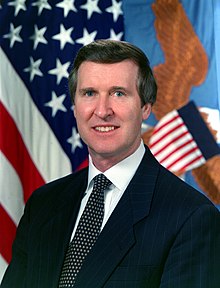William Cohen | |
|---|---|
 Official portrait, 1997 | |
| 20th United States Secretary of Defense | |
| In office January 24, 1997 – January 20, 2001 | |
| President | Bill Clinton |
| Deputy | John Hamre Rudy de Leon |
| Preceded by | William J. Perry |
| Succeeded by | Donald Rumsfeld |
| United States Senator from Maine | |
| In office January 3, 1979 – January 3, 1997 | |
| Preceded by | William Hathaway |
| Succeeded by | Susan Collins |
| Chair of the Senate Aging Committee | |
| In office January 4, 1995 – January 3, 1997 | |
| Preceded by | David Pryor |
| Succeeded by | Chuck Grassley |
| Chair of the Senate Indian Affairs Committee | |
| In office January 5, 1981 – January 3, 1983 | |
| Preceded by | John Melcher |
| Succeeded by | Mark Andrews |
| Member of the U.S. House of Representatives from Maine's 2nd district | |
| In office January 3, 1973 – January 3, 1979 | |
| Preceded by | William Hathaway |
| Succeeded by | Olympia Snowe |
| Mayor of Bangor, Maine | |
| In office 1971–1972 | |
| Member of the Bangor City Council | |
| In office 1969–1972 | |
| Personal details | |
| Born | William Sebastian Cohen August 28, 1940 Bangor, Maine, U.S. |
| Political party | Republican |
| Spouse(s) |
Diana Dunn (div. 1987) |
| Children | 2 |
| Education | Bowdoin College (BA) Boston University (LLB) |
William Sebastian Cohen (born August 28, 1940) is an American lawyer, author, and politician from the U.S. state of Maine. A Republican, Cohen served as both a member of the United States House of Representatives (1973–1979) and Senate (1979–1997), and as Secretary of Defense (1997–2001) under Democratic President Bill Clinton.[1]
Described as "a Republican moderate from Maine" and "something of a maverick centrist" by David Halberstam, Cohen had very good working relations with President Clinton and National Security Adviser Sandy Berger and an "almost ideal" collaboration with the Joint Chiefs of Staff;[2] however he often clashed with Secretary of State Madeleine Albright, whom he saw as "a grandstander, too outspoken on policy matters, and too eager to use military force."[2]
- ^ "William S. Cohen - William J. Clinton Administration". Office of the Secretary of Defense - Historical Office.
- ^ a b Charles A. Stevenson, SECDEF: The Nearly Impossible Job of Secretary of Defense, pp. 105–114, Potomac Books, 2006